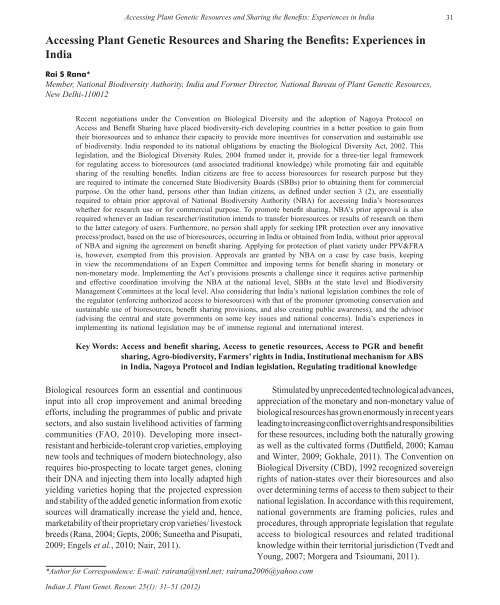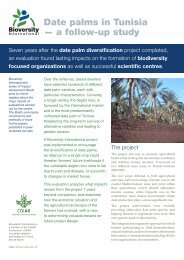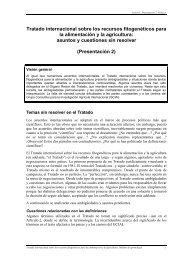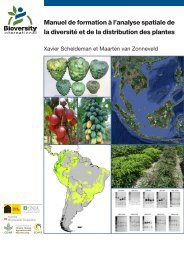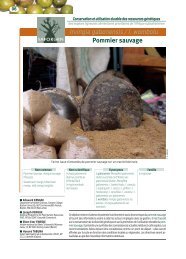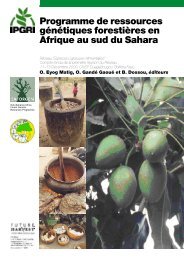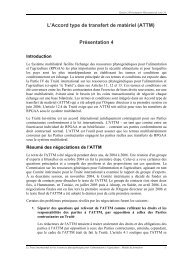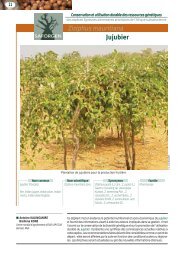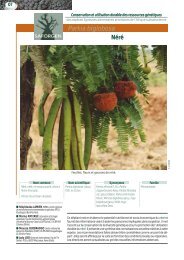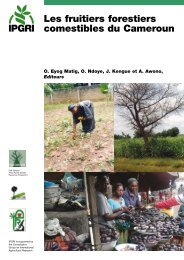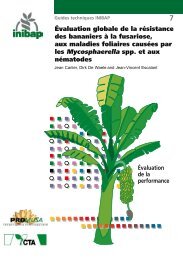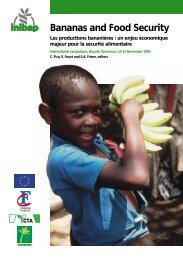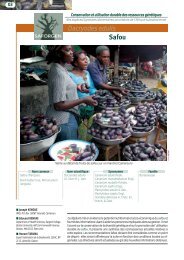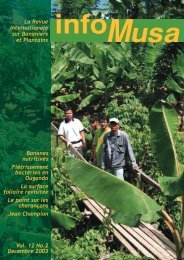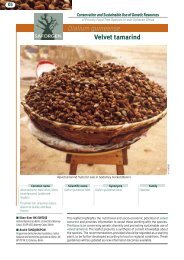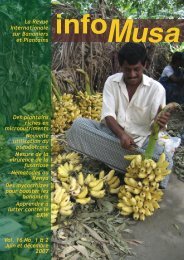indian society of plant genetic resources - Bioversity International
indian society of plant genetic resources - Bioversity International
indian society of plant genetic resources - Bioversity International
Create successful ePaper yourself
Turn your PDF publications into a flip-book with our unique Google optimized e-Paper software.
Indian J. Plant Genet. Resour. 25(1): 31–51 (2012)<br />
Accessing Plant Genetic Resources and Sharing the Benefi ts: Experiences in India 31<br />
Accessing Plant Genetic Resources and Sharing the Benefi ts: Experiences in<br />
India<br />
Rai S Rana*<br />
Member, National Biodiversity Authority, India and Former Director, National Bureau <strong>of</strong> Plant Genetic Resources,<br />
New Delhi-110012<br />
Recent negotiations under the Convention on Biological Diversity and the adoption <strong>of</strong> Nagoya Protocol on<br />
Access and Benefi t Sharing have placed biodiversity-rich developing countries in a better position to gain from<br />
their bio<strong>resources</strong> and to enhance their capacity to provide more incentives for conservation and sustainable use<br />
<strong>of</strong> biodiversity. India responded to its national obligations by enacting the Biological Diversity Act, 2002. This<br />
legislation, and the Biological Diversity Rules, 2004 framed under it, provide for a three-tier legal framework<br />
for regulating access to bio<strong>resources</strong> (and associated traditional knowledge) while promoting fair and equitable<br />
sharing <strong>of</strong> the resulting benefi ts. Indian citizens are free to access bio<strong>resources</strong> for research purpose but they<br />
are required to intimate the concerned State Biodiversity Boards (SBBs) prior to obtaining them for commercial<br />
purpose. On the other hand, persons other than Indian citizens, as defi ned under section 3 (2), are essentially<br />
required to obtain prior approval <strong>of</strong> National Biodiversity Authority (NBA) for accessing India’s bio<strong>resources</strong><br />
whether for research use or for commercial purpose. To promote benefi t sharing, NBA’s prior approval is also<br />
required whenever an Indian researcher/institution intends to transfer bio<strong>resources</strong> or results <strong>of</strong> research on them<br />
to the latter category <strong>of</strong> users. Furthermore, no person shall apply for seeking IPR protection over any innovative<br />
process/product, based on the use <strong>of</strong> bio<strong>resources</strong>, occurring in India or obtained from India, without prior approval<br />
<strong>of</strong> NBA and signing the agreement on benefi t sharing. Applying for protection <strong>of</strong> <strong>plant</strong> variety under PPV&FRA<br />
is, however, exempted from this provision. Approvals are granted by NBA on a case by case basis, keeping<br />
in view the recommendations <strong>of</strong> an Expert Committee and imposing terms for benefi t sharing in monetary or<br />
non-monetary mode. Implementing the Act’s provisions presents a challenge since it requires active partnership<br />
and effective coordination involving the NBA at the national level, SBBs at the state level and Biodiversity<br />
Management Committees at the local level. Also considering that India’s national legislation combines the role <strong>of</strong><br />
the regulator (enforcing authorized access to bio<strong>resources</strong>) with that <strong>of</strong> the promoter (promoting conservation and<br />
sustainable use <strong>of</strong> bio<strong>resources</strong>, benefi t sharing provisions, and also creating public awareness), and the advisor<br />
(advising the central and state governments on some key issues and national concerns). India’s experiences in<br />
implementing its national legislation may be <strong>of</strong> immense regional and international interest.<br />
Key Words: Access and benefi t sharing, Access to <strong>genetic</strong> <strong>resources</strong>, Access to PGR and benefi t<br />
sharing, Agro-biodiversity, Farmers’ rights in India, Institutional mechanism for ABS<br />
in India, Nagoya Protocol and Indian legislation, Regulating traditional knowledge<br />
Biological <strong>resources</strong> form an essential and continuous<br />
input into all crop improvement and animal breeding<br />
efforts, including the programmes <strong>of</strong> public and private<br />
sectors, and also sustain livelihood activities <strong>of</strong> farming<br />
communities (FAO, 2010). Developing more insectresistant<br />
and herbicide-tolerant crop varieties, employing<br />
new tools and techniques <strong>of</strong> modern biotechnology, also<br />
requires bio-prospecting to locate target genes, cloning<br />
their DNA and injecting them into locally adapted high<br />
yielding varieties hoping that the projected expression<br />
and stability <strong>of</strong> the added <strong>genetic</strong> information from exotic<br />
sources will dramatically increase the yield and, hence,<br />
marketability <strong>of</strong> their proprietary crop varieties/ livestock<br />
breeds (Rana, 2004; Gepts, 2006; Suneetha and Pisupati,<br />
2009; Engels et al., 2010; Nair, 2011).<br />
*Author for Correspondence: E-mail: rairana@vsnl.net; rairana2006@yahoo.com<br />
Stimulated by unprecedented technological advances,<br />
appreciation <strong>of</strong> the monetary and non-monetary value <strong>of</strong><br />
biological <strong>resources</strong> has grown enormously in recent years<br />
leading to increasing confl ict over rights and responsibilities<br />
for these <strong>resources</strong>, including both the naturally growing<br />
as well as the cultivated forms (Duttfi eld, 2000; Kamau<br />
and Winter, 2009; Gokhale, 2011). The Convention on<br />
Biological Diversity (CBD), 1992 recognized sovereign<br />
rights <strong>of</strong> nation-states over their bio<strong>resources</strong> and also<br />
over determining terms <strong>of</strong> access to them subject to their<br />
national legislation. In accordance with this requirement,<br />
national governments are framing policies, rules and<br />
procedures, through appropriate legislation that regulate<br />
access to biological <strong>resources</strong> and related traditional<br />
knowledge within their territorial jurisdiction (Tvedt and<br />
Young, 2007; Morgera and Tsioumani, 2011).


